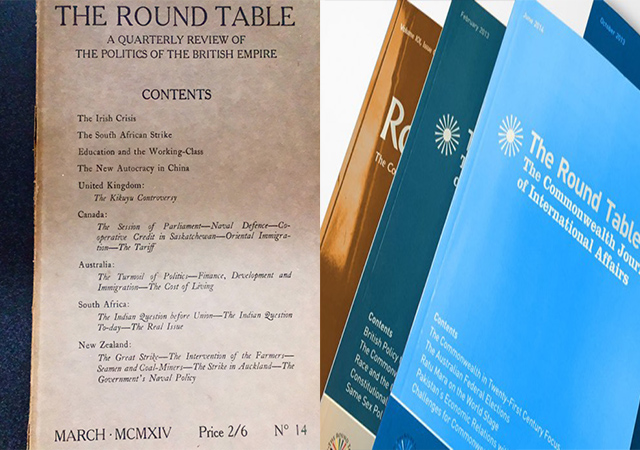
[This excerpt is from an article in a 1939 edition of the Round Table Journal.From 1921 the UK administered the former Ottoman territories of Palestine and Transjordan as League of Nations ’mandates’. This followed the Balfour Declaration of 1917, which supported the establishment of a Jewish ‘national home’ in Palestine. By the late 1930s, communal violence between Arabs and Jewish settlers had resulted in the so-called ‘Arab uprising’. This article brought together (anonymously) contributions from Canon Charles Bridgeman (of Jerusalem), A. Alexander (of the Anglo-Jewish Association), Neville Laski (brother of Harold), and historian Arnold Toynbee; the latter (on behalf of the Round Table) advocated a federal solution in the wider region. The article is currently free-to-access under our ‘From the Archives’ series.]
From A Federal Solution: An editorial
Cannot the French and British Governments put their heads together to compass the common solution of their parallel problems in the Levant? Together they may hope to extricate themselves from the analogous difficulties in which their respective mandates have involved them.
The wider federation, which would no doubt have special relations with neighbouring States—Turkey, ‘Iraq, Saudi Arabia, Egypt—obviously cannot be brought into being at once. Even if there were no other obstacles, the French Government have matters almost as difficult as the Jew-Arab conflict to settle in Syria and the Lebanon before they will feel able to relinquish their mandatory control. But it will surely be wise for the British Government, if it can obtain the concurrence of the French to declare publicly now that this is the goal towards which its eyes are turned, as it continues to carry out its under-takings to both Jews and Arabs. Only with the compensation of a promised wider unity are the Arabs likely to be reconciled both to the continuance of Jewish immigration into Palestine and to what that necessarily implies, the creation of an Arab minority in the mixed Jewish-Arab area. Only thus can Great Britain be permanently assured of the friendship of a group of peoples occupying territory of extreme importance for British Commonwealth defence, while at the same time she can be rid of the arduous and painful task of internal defence that she now shoulders in Palestine.These are the fundamental strategic considerations for Great Britain, though there are other important questions, such as the use of Haifa for naval purposes and the defence of the oil pipe-line, which would have to be settled after the model of the Anglo-Egyptian treaty of alliance.
In the meantime, a form of territorial rather than numerical limitation of immigration into Palestine is the only path towards self-government for Palestine that is compatible with realism and with Great Britain’s international duty. Numerical limitation on the lines of a maximum Jewish percentage, which may be found advisable as a temporary expedient, cannot be more than that. And if the revised cantonisation idea—partition without partition—is to be a stepping stone to something greater and more lasting, it must provide for the establishment of common democratic institutions for all matters of common concern to the Arab and the mixed areas. The two communities must not be allowed to grow further and further apart, but from the beginning must have the means of facing their common problems—which are many—not as enemies but as co-operators in self-government. At first, while Great Britain retains her full mandatory powers, these representative institutions will have to be only advisory in the more important fields; but the unwritten principle should be adopted that if the two communities are agreed the mandatory Power will concur, subject to any over-riding reasons of state. Among the matters of greatest moment that will fall to the all-Palestinian democratic institutions to consider will be the collection and distribution of revenues from joint sources, such as the yield of the common customs tariff. By this process, rather than by any direct book-keeping adjustment, will the greater wealth of the Jewish community serve to raise the administrative and economic standard among the Arabs.
The common interests of the two communities—indeed of all the peoples dwelling in the lands that lie between the Mediterranean and the Indian Ocean with its two north-western fingers—are plain both in the economic and in the strategic spheres. The problem is to combine the service of the common interests with satisfaction for the national aspirations of both Jews and Arabs. It can only be done if those aspirations find scope on two different planes—those of the Jews in that portion of Palestine of which they will have freedom to make whatever they can, those of the Arabs in the wider confederation of the Near East.



